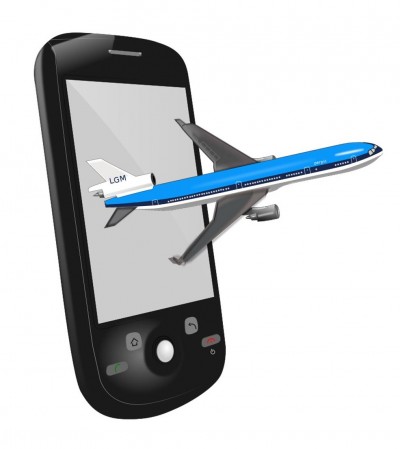Airlines see a mere 13% of volume on mobile devices according to new report.
A recent report from Netherlands-based global multichannel payment company Adyen revealed that travel made up 15.5% of mobile transactions on its global payments network in Q1 2016. While m-payments made up 32% of overall online payments in this year’s first quarter, in the travel sector, the share plummets to 15%. According to Adyen, these findings show that there is opportunity to extend the reach of smartphones and tablets in the travel industry.
Compared to other industries, the travel sector sees significantly fewer mobile transactions.
The report – Mobile Payments Index 2016: Travel Edition – shows that while accommodation services see 17% of volume on mobile devices, airlines see only 13%. Also, tablets are the preferred choice among mobile devices when it comes to booking in the travel industry.
 President of North America at Adyen, Kamran Zaki, stated that the travel sector is seeing notably fewer browser-based payments happen on mobile compared to other industries. Zaki added that “an average of only 15 percent of online payments take place on a mobile device, compared to over 30 percent across all verticals” among airline and accommodation merchants on the Adyen platform.
President of North America at Adyen, Kamran Zaki, stated that the travel sector is seeing notably fewer browser-based payments happen on mobile compared to other industries. Zaki added that “an average of only 15 percent of online payments take place on a mobile device, compared to over 30 percent across all verticals” among airline and accommodation merchants on the Adyen platform.
However, airlines investing in mobile offerings are seeing higher m-payments activity.
Even though only 13% of transactions for airlines are occurring on mobile, Adyen’s report also pointed out that the airlines investing in their mobile offerings are actually seeing higher than average activity in regard to mobile payments.
For instance, European airline Transavia has a share of mobile payments that is 65% higher than the average.
Adyen CCO Roelant Prins said “We are moving to a future where many loyal travel industry customers will make their entire journey in-app, from initial booking to final checkout, with payments as a key step in that journey.” He added that aside from in-app, travel merchants who invest in optimized experiences for web browsers across key types of devices are already seeing a significant increase in their mobile transaction volume.
Adyen believes that the travel industry has more opportunity to take a larger share of m-payments by branching into other mobile services like smartphone check-in among other convenient customer services.
The majority of e-commerce deals in Africa occur over smartphones.
As more Africans acquire and gain internet access via smartphones, the number of e-commerce sales taking place over mobile phones in the continent continues to rise. According to an e-commerce Q1 report data by Criteo, mobile commerce in Africa has particularly taken off in the continent’s urban regions, such as Nigeria.
M-commerce in Nigeria experienced a significant boost in the first quarter of 2016.
Vanguard reported that the study, which was released by the performance marketing firm during the Mobile West Africa conference – recently held in Lagos – revealed that the number of retail e-commerce transactions that took place via smartphones in Nigeria jumped by 73% within Q1 2016. This reflects a worldwide m-commerce trend which has increased by 39% since Q4 2015.
 The report, which revealed that smartphones are becoming the leading mobile commerce device in Africa, indicates that smartphones are responsible for approximately 18% of e-commerce transactions in Africa. This is a much higher percentage compared to the estimated 10% share made up by other mobile devices.
The report, which revealed that smartphones are becoming the leading mobile commerce device in Africa, indicates that smartphones are responsible for approximately 18% of e-commerce transactions in Africa. This is a much higher percentage compared to the estimated 10% share made up by other mobile devices.
When it comes to mobile commerce in Africa, e-commerce sales trends vary from one country to the next.
Criteo’s report also compared mobile sales trends to desktop sales trends in Nigeria and discovered that desktop e-commerce sales were dominant during the weekdays while the sales were about equal among mobile and desktop users on the weekend. The report noted that desktop usage typically increased during office hours with clicks averaging 1200% while clicks though mobile barley made it above 100%. That said, on weekends, this percentage changed with both desktop and mobile usage averaging about 250% across both devices.
Interestingly, Nigeria’s mobile commerce trends differ from South Africa’s. While Nigeria’s e-commerce sales are about equal between mobile and desktop on the weekend, in South Africa, m-commerce dominates on the weekends where retail mobile commerce appears similar to that of South East Asian countries that have a more developed e-commerce sector.
Nevertheless, mobile commerce in Africa is definitely growing. In Nigeria, alone, the report found that mobile conversion rates are steadily on the rise in the country with Android smartphones averaging 1.8% conversion rates, Android tablets at 1.5% conversion rates, and iPhones and iPads averaging 2.9%.
 President of North America at Adyen, Kamran Zaki, stated that the travel sector is seeing notably fewer browser-based payments happen on mobile compared to other industries. Zaki added that “an average of only 15 percent of online payments take place on a mobile device, compared to over 30 percent across all verticals” among airline and accommodation merchants on the Adyen platform.
President of North America at Adyen, Kamran Zaki, stated that the travel sector is seeing notably fewer browser-based payments happen on mobile compared to other industries. Zaki added that “an average of only 15 percent of online payments take place on a mobile device, compared to over 30 percent across all verticals” among airline and accommodation merchants on the Adyen platform.
 The report, which revealed that smartphones are becoming the leading mobile commerce device in Africa, indicates that smartphones are responsible for approximately 18% of e-commerce transactions in Africa. This is a much higher percentage compared to the estimated 10% share made up by other mobile devices.
The report, which revealed that smartphones are becoming the leading mobile commerce device in Africa, indicates that smartphones are responsible for approximately 18% of e-commerce transactions in Africa. This is a much higher percentage compared to the estimated 10% share made up by other mobile devices.